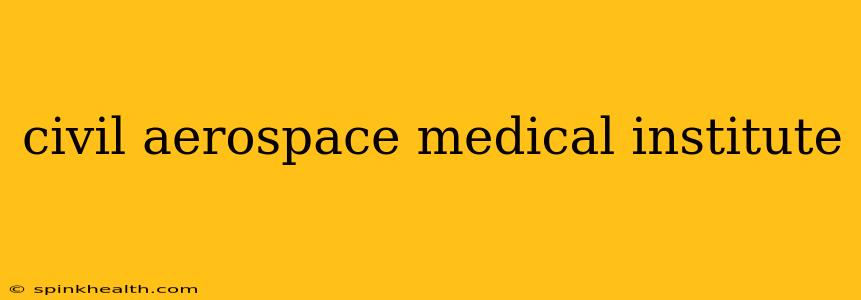The world of aviation demands precision, skill, and, above all, safety. Behind the scenes, ensuring the health and fitness of pilots and aircrew is a critical, often unseen, force: the Civil Aerospace Medical Institute (CAMI). This isn't just about routine check-ups; CAMI plays a vital role in shaping aviation safety standards worldwide, influencing everything from pilot medical certifications to groundbreaking research on aerospace medicine. Let's embark on a journey to understand this crucial organization and its profound impact on the safety of air travel.
What is the Civil Aerospace Medical Institute (CAMI)?
CAMI, a part of the Federal Aviation Administration (FAA), is the leading research and operational arm for aviation medicine in the United States. Think of them as the guardians of aircrew health, tirelessly working to ensure that the people flying us are medically fit for duty. Their work extends far beyond simple physical examinations; they delve into the intricate relationship between human physiology, performance, and the demands of flight. This encompasses everything from the effects of altitude on the human body to the impact of fatigue and stress on pilot decision-making.
What does CAMI do?
CAMI's responsibilities are multifaceted and far-reaching. They don't just examine pilots; they actively shape the very standards that govern aircrew health. Let's explore some key functions:
-
Pilot Medical Certification: CAMI establishes and maintains the medical standards for pilot certification. They develop the guidelines and procedures used by Aviation Medical Examiners (AMEs) to assess pilot fitness, ensuring only those meeting stringent health requirements receive certification.
-
Aerospace Medical Research: CAMI conducts groundbreaking research to advance our understanding of aerospace medicine. This includes investigating the effects of space travel on the human body, studying the impact of various medical conditions on pilot performance, and developing strategies to mitigate risks associated with long-haul flights.
-
Developing and Evaluating Medical Equipment: The institute plays a crucial role in evaluating the effectiveness and safety of new medical devices and technologies used in aviation, ensuring they meet the highest standards of reliability and accuracy.
-
Educational Programs and Training: CAMI provides essential training and educational resources to AMEs, pilots, and other aviation professionals, keeping them updated on the latest advancements in aerospace medicine. This helps maintain a high level of expertise across the industry.
-
Accident Investigation: In the aftermath of aviation accidents, CAMI experts may be involved in investigations, providing critical insights into the role of human factors, including health and fitness, in contributing to the accident.
What are the medical standards for pilots?
The medical standards for pilots vary depending on the class of certificate (e.g., private, commercial, airline transport) and the type of operation. Generally, pilots are required to maintain a high level of physical and mental health. This includes regular medical examinations, which assess vision, hearing, cardiovascular health, and neurological function. Specific conditions, such as certain heart conditions, epilepsy, or uncontrolled diabetes, may disqualify individuals from obtaining or maintaining a pilot medical certificate. The specific requirements are intricate and detailed, reflecting the high safety standards expected in the aviation industry. These standards are continually refined based on ongoing research and advancements in medical understanding.
How does CAMI contribute to aviation safety?
CAMI's contributions to aviation safety are immeasurable. By rigorously evaluating pilot health and continuously improving medical standards, they significantly reduce the risk of accidents caused by pilot incapacitation or impaired judgment due to medical conditions. Their research and development efforts lead to innovations that enhance flight safety and improve pilot performance. Ultimately, CAMI's work protects passengers and aircrew by maintaining the highest standards of health and fitness within the aviation community.
Who works at CAMI?
CAMI employs a diverse team of highly skilled professionals, including physicians, physiologists, psychologists, researchers, and administrative staff. Their expertise spans various fields, enabling a comprehensive approach to aerospace medicine. This multidisciplinary team works collaboratively to achieve CAMI's vital mission.
How can I learn more about CAMI?
For more in-depth information on CAMI, its research, and its impact on aviation safety, you can explore the official FAA website. They provide valuable resources and detailed insights into the institute's work. (Note: I am an AI and cannot provide specific links.)
The Civil Aerospace Medical Institute isn't just a faceless organization; it's the dedicated team working tirelessly behind the scenes to keep us safe in the skies. Their ongoing commitment to research, innovation, and the highest medical standards is a cornerstone of safe and reliable air travel.

